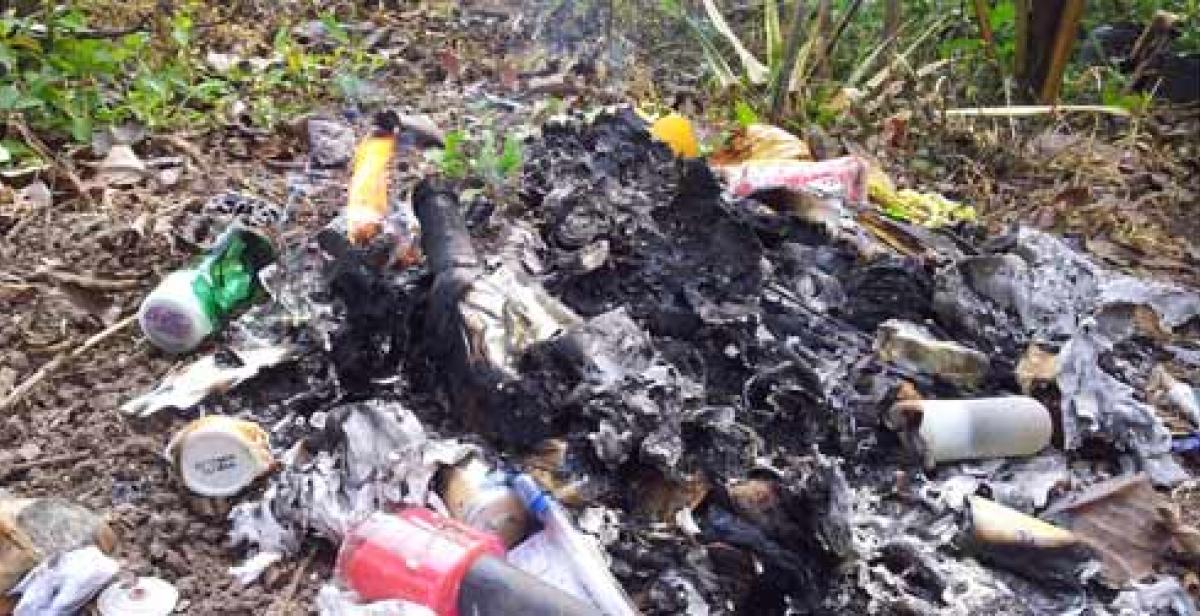We are over halfway through our Progressio ICS project, and it is a comfort to wake each morning to the crowing of the roosters, and the pat-pat of our host grandmother making tortillas. Sometimes, however, this awakening is accompanied by the acrid smell of burning plastic. At first, all the UK volunteers found it quite unsettling to see these quemas, small bon-fires, littering the yards and gardens of Dipilto Viejo, but we know now that it is an unavoidable part of daily life in rural Nicaragua.
The highlands are strikingly beautiful; every horizon is decorated with sharply peaked hills, and they are blanketed with a curious mix of coniferous forest and flat, tropical banana leaves. It is a land, we were told before we first arrived, that smells of pine and coffee. However, with no standardized method of waste disposal, the clean mountain air is often tarnished by the fumes of burning rubbish. This smoke is only adding further pressure to the respiratory illnesses common amongst the locals here, who have cooked over wood stoves for their entire lives. Our primary ICS project in Dipilto is the construction of more fuel-efficient stoves, as a way of protecting both health and the environment. However, the research that we have conducted shows that all the families here are keenly aware of the need to protect both the atmosphere and the lungs of their children. Despite this, 50% of the residents we surveyed burn their waste - for the rural Nicaraguense, there is simply no other alternative.
Coming from the UK, with our bi-weekly recycling collections, it is easy to think that waste management problems are limited to developing countries, and to communities like Dipilto. But our state-run, institutionalized rubbish-disposal system merely masks what is becoming a growing worldwide problem. The EU has arguably the most advanced disposal system on the planet. This is maintained through environmental laws, and high-tax rates on non-environmentally friendly methods of disposal. For large corporations it is therefore cheaper to export rubbish to other countries than to pay the fines for incineration, and such practices must put into question the apparent self-sufficiency of Western waste disposal. Even with the overspill of the developed world being absorbed by countries like China and India, there remains horrifying phenomena like the Great Pacific garbage patch, a floating wasteland of plastic and non-biodegradable waste that migrates across the Pacific Ocean.
In Dipilto, the local municipality’s solution to waste-disposal is the promotion of the burial of rubbish. This is a worrying prospect for the future of the commercial and sustenance farming that is the economic and social lifeblood of this region. At the same time, it their earnest attempt to protect the environment from the devil known. With just two weeks left in Nicaragua, we have realized that there is little we can do to promote recycling, or more eco-friendly methods of rubbish disposal. But we can come away with the knowledge that this is not just Dipilto’s fight, and that countries worldwide will need to re-examine their consumption practices if we hope to avoid irreparable damage to the environment.
|
Method of Waste Disposal |
% of Population Surveyed |
|
Burned |
50 |
|
Buried |
23 |
|
Collected by local government |
13 |
|
Used as fertilizer |
10 |
|
Left on the ground |
4 |
(Taken from a sample of 50 families in Dipilto Viejo)
Written by Joanna Lovatt



